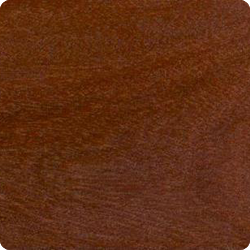Detailed Specs: Ipe
Scientific Name: Tabebuia spp.
Family: Bignoniaceae
Other Names: Amapa (Mexico), Cortez (Honduras, Nicaragua, Costa Rica), Guayacan (Panama), Guayacan polvillo (Columbia), Flor Amarillo (Venezuela), Greenhart (Suriname), Madera negra (Ecuador), Tahuari (Peru), Lapacho negro (Paraguay, Argentina)
The Tree:
May grow from 140-150 feet in height with trunk diameters up to 6 feet with frequent heights of 100 feet and diameters 2-3 feet. Boles are clear to 60 feet or more with buttresses.
The Wood
General Characteristics: The heartwood is olive brown to blackish in color, often with lighter or darker striping covered with a yellow powder and is sharply demarcated from the whitish or yellowish sapwood. The texture is fine to medium, with luster low to medium, the grain is straight to irregular. It has an oily look with no distinctive odor or taste.
Weight: Basic specific gravity (oven dry weight/ green volume) 0.85-.097; air-dry density 66-75 pcf.
Drying and Shrinkage: Generally reported to air dry rapidly with only slight checking and warping. Kiln schedule T3-C1 is suggested for 4/4 stock. Shrinkage green to oven dry: radial 6.6%, tangential 8.0%, volumetric 13.2%. Movement after manufacture is rated small.
Working Properties: It is moderately difficult to work especially when using hand tools. Also has a blunting effect on the cutting edges, finishes smoothly except where the grain is very ropey. The fine yellow dust produced in most operations may because dermatitis is some workers.
Mechanical Properties: (First and third sets of data based on 2 inch standard and the second on the 1 inch standard.)
|
Moisture |
Bending Strength (psi) |
Modules of Elasticity (1000 psi) |
Maximum Crushing Strength (psi) |
| Green (75)
12% 12% (24) 12% (44) |
22,560
25,360 25,200 28,000 |
2,920
3,140 3,010 3,350 |
10,350 13,010 14,000 N/A |
Janka hardness 3060 lb for green material and 3680 lbs. at 12% moisture content. Forest Products Laboratory toughness average for green and dry material is 404 in-lbs. (5/8 specimen)
Durability: The heartwood is very resistant to attack by decay, fungi and termites. However it does not resist marine borers. T.guayacan however, is reported to have good resistance in Panama waters.
Distribution: throughout continental tropical America and of parts of the Lesser Antilles. The tree grows on a variety of sites ranging from ridge tops, riverbanks and marsh forests.
Uses: Flooring, decking, exterior lumber, veneer, and tool handles.
References
– Chundnoff, Martin (1984), “Tropical Timbers of the World.” USDA Forest Service Ag. Handbook No.607.



